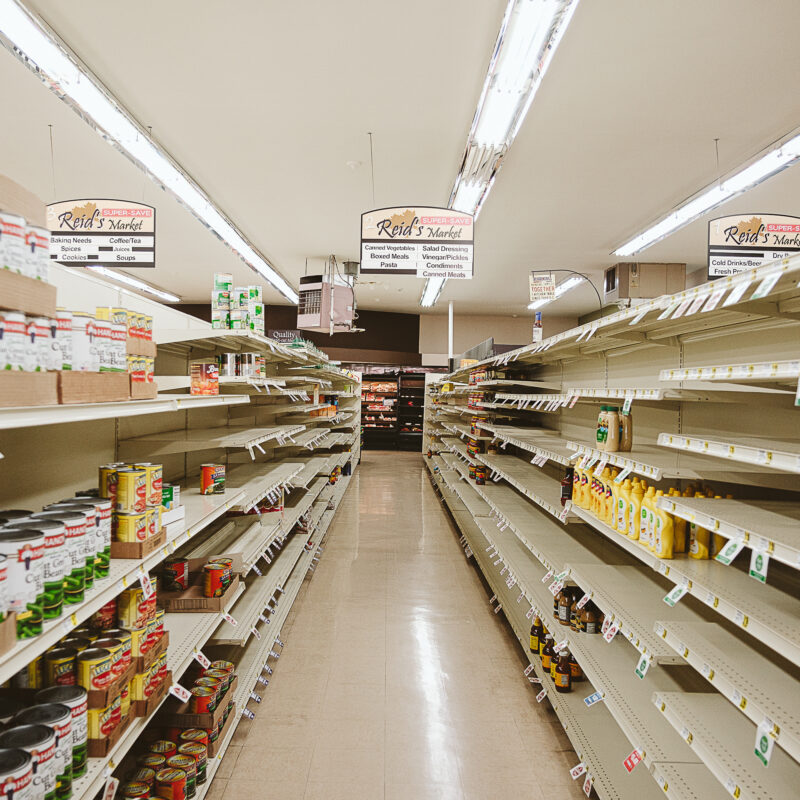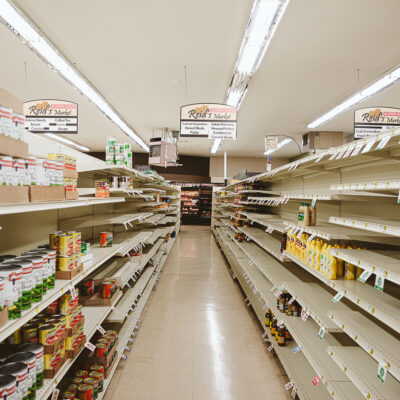Even as freezing rains tear autumn’s last leaves from branches, things in the city and county seem to be getting greener. Local greenies are jazzed about a $500,000 grant that’s bankrolling the Local Energy Alliance Program, an initiative that will offer loans to one out of every two homeowners to pay for efficiency upgrades—and will create 1,600 jobs. UVA President John Casteen seemed to have caught green fever when he called for a “Charlottesville stamp” for sustainable technologies developed here. And with these bold intentions have come accolades, like Virginia Municipal League’s platinum designation, which was awarded to the city and county for sustainable actions and policies of local officials.
| #10 WALK TO SCHOOL |
But is it really time to party? Even in Charlottesville, where people try to live softly, an ever-growing stream of waste can threaten to offset major gains. C-VILLE Weekly, for instance, is printed on 100 percent recycled paper—in an office where a huge TV broadcasts 24/7 to nobody in particular. These inconsistencies make for a zero-sum game where everybody loses, especially our grandchildren, who we’re told will be left to summit landfills to escape rising seas.
Not that landfills and global warming are the only compelling reasons to go green. Children who walk to school not only conserve fossil fuels, they’re less likely to become obese. When offices use less and recycle more, they cut costs. Less obviously, if you serve from a keg, you earn more—and it’s harder for patrons keep track of how many they’ve had.
| READ MORE
Leading Charlottesville’s |
As for doing the right thing is concerned, note that our 14 leaders aren’t zealots. They’re normal folks who want to affect incremental change, partly because they’ve found ways to profit by improving the world, but often because it’s the right thing to do. So if sustainable technologies are to be our bread and butter, here’s 10 short steps that we can take so that, for dessert, we can have our green cake and eat it too.
 |
1 POUR FROM PITCHERS
It’s always a little fishy when a local politician refuses to drink local. But bottled water’s mix of convenience and apparent affordability has changed things. What was once a matter of simply turning the tap has since the 1970s become a billion dollar industry.
In Bottlemania, Elizabeth Royte argues that bottled water costs 240 to 10,000 times more than water from the tap. (And much bottled water is, in fact, tap water.) Studies have found you can fill a quarter of a water bottle with as much oil as it takes to produce it. It makes you wonder: What, really, is the greatest hoax ever perpetrated on the American people?
American cities have begun to take a stand. In 2007, San Francisco Mayor Gavin Newsom banned city funds from being used to purchase bottled water, saving the city $500,000 per year. In the summer of 2007 our own mayor David Brown made a small splash by suggesting that the city do the same. Parched councilors licked their lips and tilted their heads in confusion—a drought had strained municipal water supplies that year. Two years after Brown’s suggestion, the facts remain. Charlottesville and Albemarle’s green leaders should ban the use of public funds to purchase bottled water for meetings, and local nonprofits and boards should do the same.
 |
2 WRAP CDs IN ART
When baby boomers discarded their turntables and LP collections, a generation of young audiophiles basked in the glory of one-dollar classics. Since then, there’s been a major resurgence in new vinyl record sales. (Look no further than the reissue bin at Sidetracks.)
But vinyl—otherwise known as polyvinyl chloride—is widely considered to be the world’s most harmful plastic. Greenpeace cautions consumers that, in landfills, dangerous additives leach from decomposing vinyl products to groundwater supplies. Dioxins are released when it’s produced and destroyed. Worse, recycling is infeasible for the cost.
So Charlottesville musicians, if you must circulate physical recordings of your side project—the noisy one where you really get to express yourself—avoid polyvinyl chloride. That means no jewel cases for CDs, which aren’t durable anyway. Instead, ask a local artist to design something to adorn your paperfoam case, or a post-consumer cardboard digipak. That way your genre-razing experiments, though maybe toxic to our ears, won’t be to your grandchildren.
 |
3 DITCH THE SOLO CUPS
How green is grog?
It’s tough to say. If we’re dealing with virgin materials, an aluminum can is twice as energy intensive to make from scratch than a glass bottle. It’s less intensive, however, to recycle aluminum.
And most people erroneously believe that glass will biodegrade in landfills, so more aluminum cans get recycled than do bottles. Bottles are heavier, so they’re more energy intensive than cans to ship. Just thinking about it can give you the spins.
Charlottesville’s venues should avoid the equation altogether, and opt instead for kegs. Although they fall somewhere between cans and bottles in container weight per drink, they’re are infinitely refillable and last about twenty years—shy of the legal age, but still not bad.
But from whence shall you sip that Starr Hill? Any performer from Lil Wayne to Morrissey can tell you glasses make projectiles make head injuries. Disposables like Solo cups would defeat the purpose. The Pavilion and all local venues should ditch bottles and cans, roll in kegs of local beer and serve drinks in sturdy plastic cups light enough so that they won’t permanently disable performers, but heavy enough so they can be reused, and won’t disable the earth.
 |
4 HANG IT OUTSIDE
Who doesn’t love to see a neighbor’s knickers adrift in the wind?
Lots of folks, apparently: Fifty million American homes are banned from hanging clotheslines on their property.
Project Laundry List, a clothesline advocacy group, lists the Rosemont Homeowners Association in Ivy, as one local region where the use of clotheslines is banned. That’s likely just one among many.
Clotheslines have somehow entered the bloated and often bizarre discussion over American property rights. Last year, in Verona, Mississippi, a man was murdered during a dispute over a clothesline. They’re also widely believed to lower property values: Who would stoop so low as to live near someone who can’t afford a clothes dryer? But clothes dryers account for at least 6 percent of household energy use in the U.S. A documentary called Drying for Freedom, slated for release next year, argues that this translates into $5 billion dollars in drying-related expenses.
Meanwhile, without the atmosphere to impede its rays, the celestial clothes dryer grows more effective by day. For now, state legislation is being considered that would protect Virginians’ right to conserve energy by air-drying their clothes. For Charlottesville, removing the obstacle isn’t enough for a step that’s so basic and so effective. City and county officials should encourage residents to dry their clothes in the sun by offering a $100 rebate that would cover the cost of hanging a clothesline.
 |
5 SHARE THE BILL
Any regular theatergoer accepts disposable playbills as part of the theatergoing ritual. There’s nothing like finding your seat and opening an attractive paper packet on your chair, reading through the director’s notes and notes on the cast, looking to see who you know.
But is it comedy or tragedy that, according to The National Resources Defense Council, the paper industry is the nation’s third leading producer of greenhouse gases? That, in landfills where no oxygen dares go, paper breaks down into methane and soluble chemicals that leach into the water supply?
It often feels like Charlottesville’s voracious appetite for nights at the theater is equaled only by its voracious appetite for virgin paper in the form of playbills. Charlottesville residents could set a green example by sharing more durable playbills at theater and music events. Those who still want to tack the bill on their bedroom wall can purchase one on the way out. This would reduce waste and serve as a reminder to all theatergoers that, like any good villain, paper doesn’t simply go away.
6 SEPARATE RESTAURANT SCRAPS
One man’s trash is another man’s treasure. Compost is a case in point. The post-consumer post-trash transforms waste to rich, workable humus that can retain lots of water and slowly release a full spectrum of nutrients unavailable in conventional fertilizers. Otherwise, that synthetic fertilizer’s going to overexert your soil and poison our waterways.
It sounds so magical that it must be rare, except that it isn’t. With Charlottesville’s booming restaurant industry, it’s hard to fathom the enormous quantity of food waste that gets tossed in the trashcan and trucked to the landfill. With the region’s rich blend of restaurants and organic farms—many of which do business with each other—it seems an enormous waste that restaurants should expend energy to cart off something so useful.
Local restaurants should follow the example of Mudhouse. The coffee shop separates all its compost for the lucky gardener looking for that nitrogen boost. (UVA’s Observatory Hill dining hall saved shipping and tipping fees when it started sending its food waste to Earlysville’s Panorama Pay-Dirt, where it’s turned to compost and sold.) For restaurants, it’d be a matter of finding another bin for food waste. Restaurateurs could buy their veggies from the farmer who absconds with their trash. Talk about efficiency.
 |
7 BAN PLASTIC BAGS
Where do plastic bags go when they die? They don’t. Many do, however, suffer a purgatory in the Pacific Ocean where as part of a Texas-sized trash island, they photodegrade and begin to work their way up the food chain.
The very qualities that makes plastic bags so useful—they’re as durable as they are pliable—makes them terrible for the environment: They’re made of oil, they can fit anywhere, they look awful and they never go away.
So it’s surprising that many American cities have bagged plans to bag bags. That’s not to say there hasn’t been progress. Ireland introduced a PlasTax in 2002, which reduced the nation’s plastic bag use by 90 percent. San Francisco followed suit in 2007, banning plastics in supermarkets and drugstores, and Los Angeles will do so next year. China—China!—banned shops from offering free plastic bags, and banned outright ultra-thin plastic bags. In many places the increased stigma of disposable plastic bags has only resulted in increased counter sales of nondisposable “green” bags.
Retailers fear that, if shoppers don’t have bags handy, they’ll be less willing to buy lots of stuff. Which is probably true. All the more reason for Charlottesville to ban bags, and in doing so, assert itself as a city willing to take major steps to decrease waste.
|
INSTANT GREEN 1. Fix instead of replacing it, buy recycled or used office furniture and equipment. 2. Get a green audit. It should pay for itself in energy and other savings. 3. Incentivize carpooling by employees. 4. Opt for teleconferencing instead of flying or driving on business trips. 5. Cap temperatures for heating and A/C. 6. Never, ever, ever run your A/C and leave your front door open at the same time. 7. Encourage employees not to use handicapped door openers unless they’re, well, handicapped. 8. Cut down on the energy-sucking soda machines. 9. Overhaul public hours to avoid running lights and HVAC during “dead zones.” 10. Mandate employees turn computers off at night unless the machines are actually functioning. |
8 BURY YOURSELF IN PAPER
Each year, hundreds of thousands of gallons of embalming fluid, including formaldehyde, labeled by the EPA as a probable carcinogen, enter the ground with old grandpap. It’s suspected that thousands of pounds of mercury are released in grandma’s cremations yearly.
Casket funerals are responsible for the costly harvest of countless tons of steel, copper, bronze, concrete and valuable hardwoods that are displayed for a couple days, if even that, before they’re buried again forever. It turns out even the evil that men do is oft interred with their bones.
Ecopods, on the other hand, are a sustainable alternative, elegant in design and made of 100 percent recycled paper. But you won’t find a cemetery that will accept them in Charlottesville. Those who, upon death, would like to return their matter to the earth can choose between two eco-cemeteries forests in Virginia, one in Loudoun County, another in Tidewater. The National Funeral Directors Association estimates that, at around $7,000, green burials cost less on average than your average burial, and bodies aren’t preserved with dangerous chemicals. (No open caskets, please.)
Charlottesville cemeteries should open their gates to these eco-conscious souls. For even if your casket’s lead—it’s just like God said—you are dust and to dust you shall return.
9 PRESS ‘SEND,’ NOT ‘PRINT’
The average office creates 1.5 pounds of paper waste per worker every day. That means the average American office worker, who weighs around 170 pounds, sends nearly twice his or her body weight in unnecessary trash to landfills yearly. (The ratio is worse for lawyers, who are thinner and waste more paper.)
Meanwhile, the very paper that can be flipped and replaced in the printer—before it’s recycled up to nine times—accounts for 25 percent of landfill mass.
These major blows to the environment also spell major waste for the city and county’s utilities and administrative facilities. The city and county could demonstrate a commitment to sustainability if they made it policy to communicate internally by e-mail. Such a move would not only save precious paper, so costly to make and discard, it would also save serious money. Sensitive documents can be safely e-mailed and returned more quickly than their paper counterparts for free. Just turn off your computers when you go home for the day.
 |
10 WALK TO SCHOOL
It used to be that kids walked to school, no questions asked. They often did so uphill, both ways. As childhood obesity rates skyrocket, hoofing it is increasingly regarded as a heroic effort in a region where new development tends to leave kids further from schools, and closer to the candy store. All of this in a world that grows less safe with each passing day.
Charlottesville’s Alliance for Community Choice in Transportation has worked since 2002 to implement a Safe Routes to School program, designed to make walking to school “safer, easier, and more enjoyable.” It’s good that schools have promoted walk-to-school days, where children are encouraged to forego the ride and get outside. (November 20 was Walk to School day in Crozet.)
But the city and county should commit themselves to sustainable everyday transportation practices, rather than the occasional walk-to-school holiday. That means buses shouldn’t enter walkable subdivisions and neighborhoods where walking buses—where a parent volunteers to collect neighborhood children and safely deliver them to their destination—suffice.





